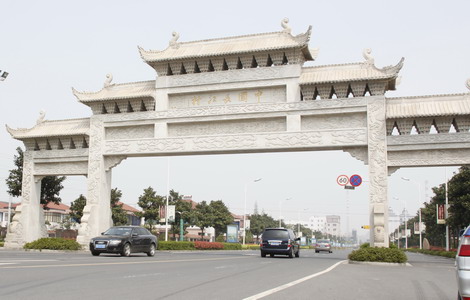 |
|
|
|
|||||||||||
|
 |
|
A stone gate, in the shape of Chinese paifang (memorial archway gate), stands in the south of the village. [Photo / China Daily] |
Like Huaxi, Changjiang was led to prosperity by a revered patriarch, Li Liangbao.
When China embraced reform and opening-up in the 1980s, Changjiang was an agrarian hovel reachable by dirt roads.
Li, then the local Party chief, seized on the new market freedoms to shift its economy from farming to manufacturing, with an initial investment of 700 yuan of collective funds in 1972.
After years of hard work, the diligence of Li and his team is paying off. His two small brick kilns have grown into a conglomerate diversified in iron and steel, fasteners, chemicals, steel tubes and plates, as well as hotel, real estate, logistics, investment and import and export businesses.
In 2011, the Xin Chang Jiang Group, comprising 17 subsidiaries, had 48 billion yuan turnover, placing it 195th among the top 500 businesses in China. By 2015, the group plans to generate 120 billion yuan in sales revenue.
"Only ponder the path to success, and don't seek pretexts for failure," Li said in a slogan, which is printed on the back of a monument in the village's central park, along with more of his beliefs, such as "care about common people and reward society".
Under his leadership, Changjiang has clearly prospered. The villagers get lavish annual stipends, live in spacious single-family homes instead of the country's usual cramped apartments, drive imported cars, and get basic insurance and education.
Everyone owns a piece of the conglomerate, bringing every resident dividends in recent years.
"Compared with Huaxi, the benefits in Changjiang are pretty practical," said Gu Weiming, a local restaurant owner.
The 72-year-old Li Liangbao is honored in the community but is scarcely known to the outside world. Introductory material given by local publicity officials indicate that Li was a workaholic in the past decades.
"To fulfill his promise, he always gets up at around 4 or 5 o'clock in the morning," the material said. "He left footprints at every corner of the village as he inspected factories and construction sites to ensure the scheduled progress and quality were achieved.
"His head was like a computer, his brain as useful as a database."